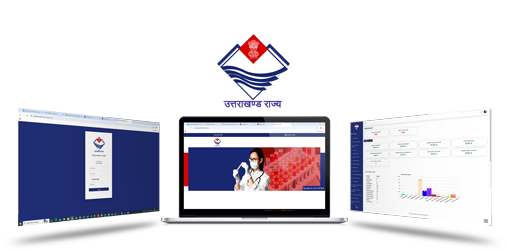
UK Covid Kavach
Type: Web Portal
Technology: NET Framework
The UK Covid Kavach project was a crucial approach to the COVID-19 pandemic in Uttarakhand, India. As a key contributor to this initiative, Ethics Infotech developed a comprehensive web portal to support both citizens and government authorities. The platform provided essential services such as real-time updates on COVID-19 cases, a robust system for managing home isolation cases, and a data-driven approach to inform public health strategies. By leveraging .NET Framework, we created a scalable and efficient solution that effectively addressed the challenges posed by the pandemic.
OBJECTIVES
Marketing Objectives
Increase public awareness: Promote the UK Covid Kavach portal to increase public knowledge about its features and benefits.
Drive user adoption: Encourage citizens of Uttarakhand to register and use the portal for COVID-19-related information and services.
Build trust and credibility: Position the Uttarakhand government as a reliable source of information and support during the pandemic.
Generate positive public sentiment: Create a positive image of the government's response to the COVID-19 crisis.
Technical Objectives
Ensure system reliability: Maintain high system availability and performance to support a large number of users.
Enhance data security: Protect sensitive user data and comply with relevant data privacy regulations.
Optimize system performance: Improve response times and reduce system load through performance tuning and optimization.
Expand system functionality: Find ways to enhance current features or introduce new ones in response to customer input and evolving requirements.
PROJECT OUTCOMES
Improved patient management: Effective tracking and support for home isolation patients, leading to better health outcomes.
Enhanced public health response: Timely and accurate data for informed decision-making by health authorities.
Increased public trust: Improved public perception of the government's response to the pandemic.
Strengthened healthcare infrastructure: Identification of gaps in healthcare services and development of strategies to address them.
Project Challenges
Data privacy and security: Protecting sensitive patient information while ensuring data accessibility for authorized personnel.
System reliability and scalability: Making sure there are no interruptions while a large amount of users and data are handled by the system.
Integration with existing systems: Integrating the new system with existing government infrastructure and databases.
Resource constraints: Managing limited budget, personnel, and time resources effectively.
Public acceptance and adoption: Encouraging public trust and adoption of the new platform.
Rapidly evolving situation: Adapting to changing COVID-19 circumstances and public health guidelines.